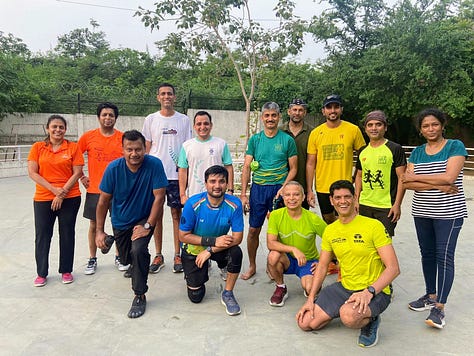Happy 20th, Aru! Your world is wide open. Embrace freedom with wisdom, chase dreams with passion, and know you're always grounded in love.



Can't wait to see where your journey takes you!
Talking about journeys, we had an interesting experiential learning experience for my B2B Marketing students through a B2B Pricing Strategy Simulation which provided invaluable insights into the complexities of pricing decisions in a competitive market. MBA students learned how pricing strategies impact revenue, market share, and profitability, requiring a delicate balance between customer value and cost structures. The simulation emphasised the importance of data-driven decision-making, allowing students to experiment with various pricing models and observe their outcomes in real time. Additionally, it highlighted the interconnectedness of pricing with other managerial decisions, such as dealing with competitors’ reactions and government policymaking.
Overall, this hands-on experience deepened students' understanding of strategic pricing in B2B contexts, fostering a holistic approach to business decision-making. You can read some students’ insights here, here , here , and here.
Before we dive in further, if you are reading for the first time, please subscribe for a weekly email discussing Running Platform Marketing Life.
AND if you are a friend of the RPML, do share it with others. You can add more of your friends to the Community of Platform’ed by using the following link.
Do share your feedback on this newsletter if you have not done it yet.
DTW
During the Week, on India's 78th Independence Day, Bhavish Aggarwal, Ola Electric Chairman and CEO announced significant advancements to mark the occasion. The company's "Sankalp 2024" event showcased its commitment to technological freedom through domestic AI chip development, a 1-gigawatt data center, and an AI-powered customer service tool. This focus on self-reliance seemed to align with the spirit of Independence Day thus syncing with larger political narrative.
Simultaneously, Ola also announced its entry into the electric motorcycle market, a segment crucial for clean transportation, further emphasizing freedom from fossil fuel dependence. The company rebranded its ride-hailing service as Ola Consumer,reflecting its broader vision beyond cabs, and reintroduced Ola Share, a ride-sharing option, symbolizing freedom of choice for consumers.
During his presentation, Aggarwal explained six reasons why commerce in India is lagging:
high cost of middle men, high logistics cost, poor and costly discovery (of services for the consumers; takes a lot of research), expensive and inaccessible credit, inefficient warehousing and legacy manufacturing (we don’t have the supply chains of modern products in India),
By showcasing these advancements on Independence Day, Ola linked its vision for the future with India's journey towards self-reliance and a more inclusive society. Though a number of analysis including one Edited by Nikhil Subramaniam have pointed out that though Aggarwal and Ola have always chased new plans aggressively, and in the case of Ola Electric and Krutrim, that aggression is on full display. This is truly a case of easier said than done.
Independence Day is also about reaffirming our faith in the democratic traditions of India and believe in the power of communities to rise together.


I have written about power of platforms in democracy, nation states, regulations, negative network externalities , brands, news media , Freedom of Expression and social good. I have tried to summarise some of the key learnings from previous posts to discuss the Platforms’ influence on our public life in this summary post titled Platforms and Public Life.
The journey of Ola Electric, as discussed, is a vivid example of how digital platforms and the platform mindset are reshaping industries and driving bold new futures. Yet, this transformation is not limited to a single company or industry; it is a global phenomenon that has already begun to redefine the concept of freedom in business and society.
Consider Tesla, which has pioneered not just electric vehicles but an entire ecosystem of clean energy solutions, from solar power to battery storage. Tesla's platform-based approach, which seamlessly integrates hardware, software, and services, has set new standards for innovation. This model has enabled the company to rapidly scale, constantly update its products via over-the-air software updates, and even create new revenue streams through services like autonomous driving features. Tesla's journey is a testament to the power of platforms in liberating companies from traditional constraints, allowing them to lead in sustainability while fostering a new kind of consumer relationship built on continuous engagement and improvement.
In another example, Amazon has used its platform to revolutionize retail, not just by being the largest online marketplace but by creating a vast ecosystem that includes cloud computing, logistics, and even entertainment. Through its platform, Amazon has given businesses of all sizes the freedom to reach global markets, scale their operations with minimal overhead, and innovate without the traditional barriers of entry. The platform mindset has enabled Amazon to diversify and dominate multiple sectors, proving that freedom in business today is closely linked to the ability to leverage digital ecosystems.
Even in the world of finance, platforms like PayPal and Square have democratized access to financial services, enabling small businesses and entrepreneurs to participate in the global economy with minimal friction. These platforms have expanded financial freedom by offering tools that were once only accessible to large corporations, thereby leveling the playing field and fostering innovation across industries.
However, the freedom to innovate and disrupt, as these examples show, also comes with a heightened responsibility for transparency and accountability. Tesla, for instance, has faced scrutiny over its ambitious timelines and safety concerns, much like Ola Electric. Amazon's vast influence has raised questions about labor practices and market power, highlighting the need for ethical considerations as businesses scale.
This global perspective on the platform mindset illustrates that the future of business is increasingly about harnessing digital ecosystems to drive innovation and growth. Yet, this freedom must be balanced with a commitment to responsible practices. Whether in automotive, retail, finance, or any other industry, the most successful companies will be those that not only break new ground but do so in a way that builds trust and delivers sustainable value to society.
In this sense, digital platforms are more than just tools for business; they are enablers of a new kind of freedom—one that empowers companies to innovate, engage, and lead responsibly in a rapidly changing world. As we move forward, the true expression of freedom in the digital age will be found in how businesses balance their bold aspirations with the realities of ethical leadership and societal impact.
As an aside, what can go wrong for Ola: From ferrying people to ferrying everything in 10 minutes. Because why not throw another hat in the already crowded ring of instant gratification?
OTW
Over the Weekend, we finally started our training taper for the Annual Hyderabad Marathon scheduled on 25th August 2024. At PeeranCheruvu Runners, we actually take tapering rather *seriously*.



As race day approaches, it's vital for runners to embrace tapering. By gradually reducing our training volume, we allow our muscles to recover while maintaining our fitness. This phase helps prevent injuries, reduces fatigue, and enhances glycogen storage. Runners must prioritise quality sleep and balanced nutrition during tapering, as they’re key to optimal recovery. By following this approach, marathoners would be fresh, energised, and fully prepared to perform at their best on race day.
Also, Rakhi came early for us as Archana’s sister and family visited us over the weekend. Raksha Bandhan, a tapestry of love and duty, is woven with threads of togetherness. Festive platters laden with sweets and savories unite families. The sacred thread, a symbol of protection, binds siblings in an unbreakable bond. Amidst the merriment, shared laughter and cherished moments create memories to relish.






To my sister and cousins: Here is to more Laughter, Loyalty, and Lifelong memories.
I Love You
Shailendra





The Pricing Simulation provided valuable insights into the complexities of B2B pricing, particularly in navigating competition, government regulations, and external uncertainties. Maintaining our pricing objectives was a key challenge, yet our team successfully adhered to them, achieving reasonable profits even during a recession.
In the digital age, platforms enjoy significant freedom, enabling them to transcend geographical boundaries and access wider markets. This capability is particularly beneficial for SMEs, allowing them to showcase their products and services on a global stage. Digital platforms also empower consumers by offering a wide range of choices to meet their diverse needs.
The advent of Digital Public Infrastructure (DPI) has significantly amplified this freedom, particularly in fostering economic and social inclusion. DPI provides the foundational infrastructure that supports digital identities, payment systems, and data exchanges, all of which are crucial for the seamless operation of digital platforms. By standardizing and democratizing access to digital tools, DPI ensures that even the smallest enterprises can compete on a level playing field, breaking down barriers that traditionally limited market access.
Furthermore, DPI is pivotal in advancing societal freedoms by enabling more equitable access to essential services such as healthcare, education, and financial services. It empowers individuals by granting them control over their digital identities and data, fostering a more inclusive digital economy. Through initiatives like open banking, universal payment interfaces, and digital health records, DPI facilitates greater transparency, accountability, and trust in digital transactions.
In essence, DPI is not just an enabler of digital transformation but also a catalyst for freedom—freedom to innovate, to participate in the global economy, and to access critical services. By addressing population-scale issues and bridging digital divides, DPI plays a vital role in achieving the broader goals of inclusion, accessibility, and empowerment for all.